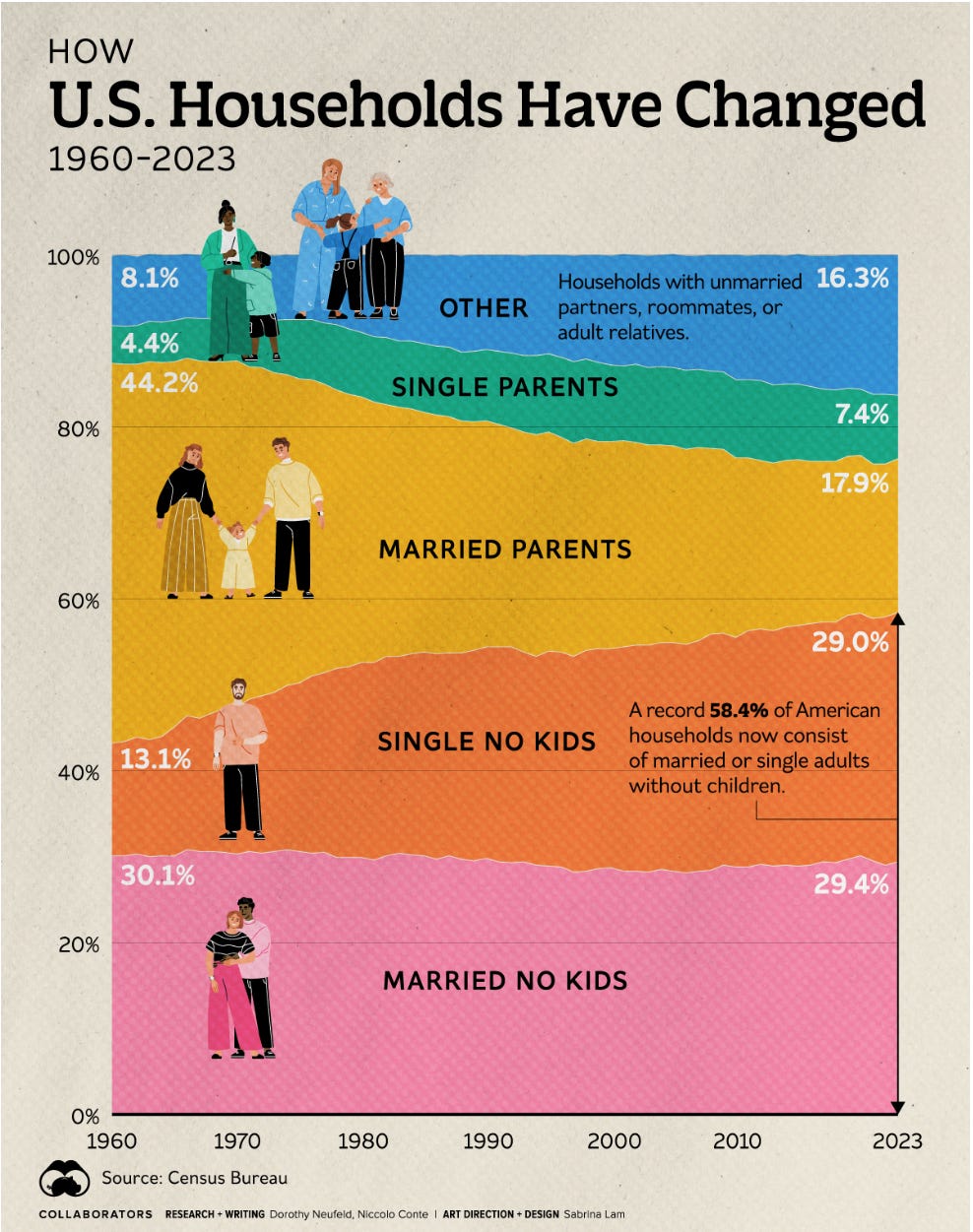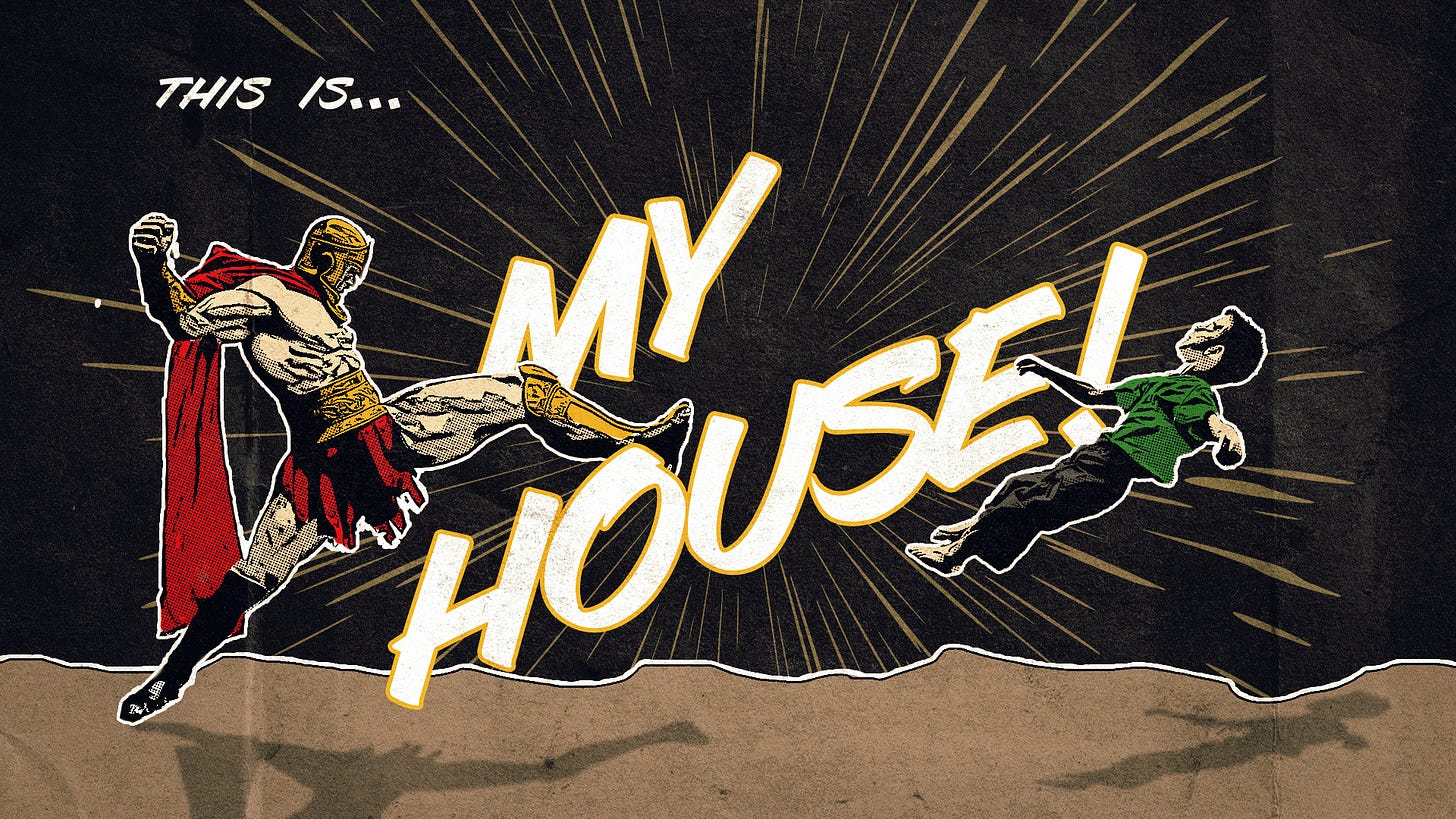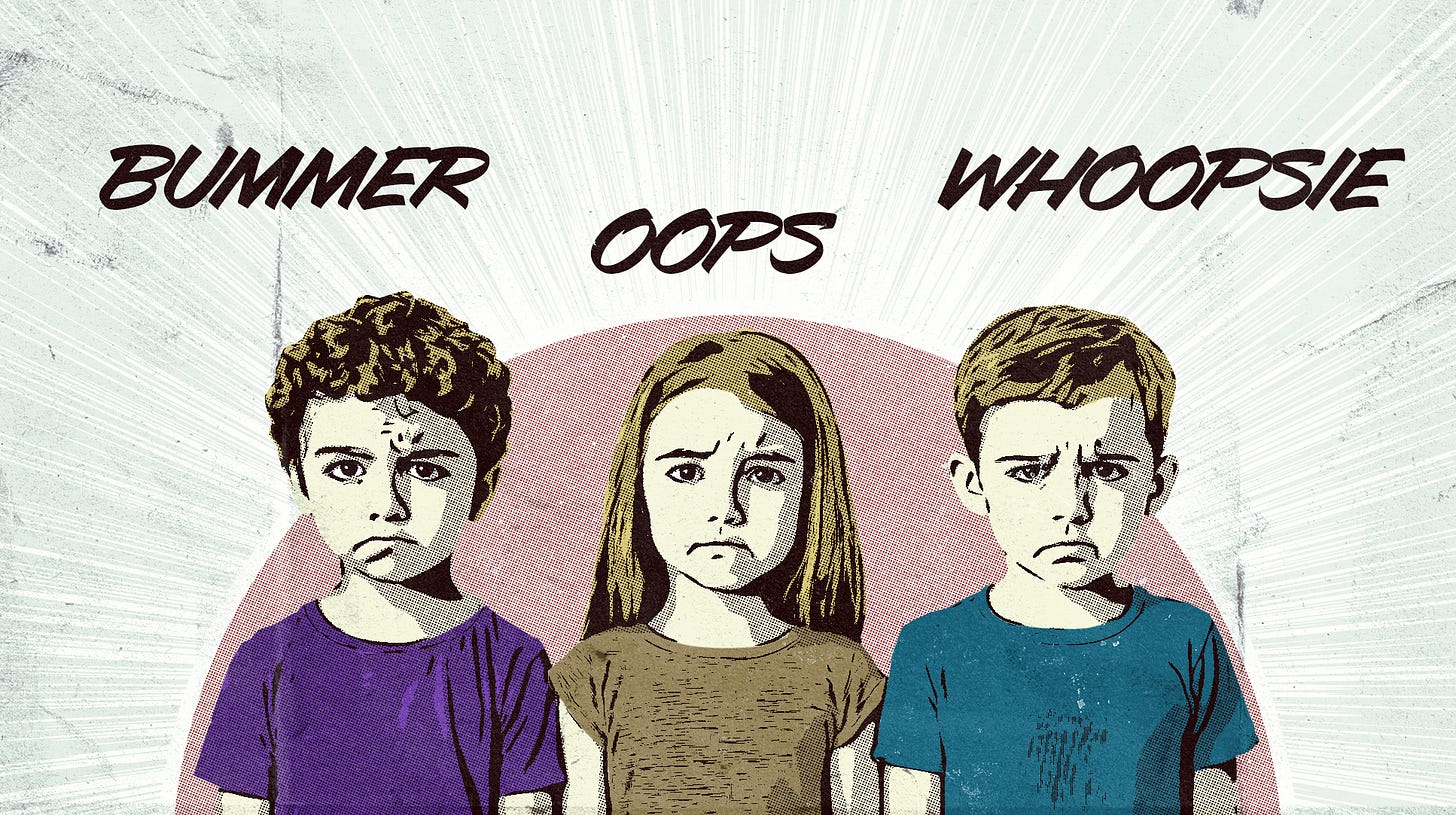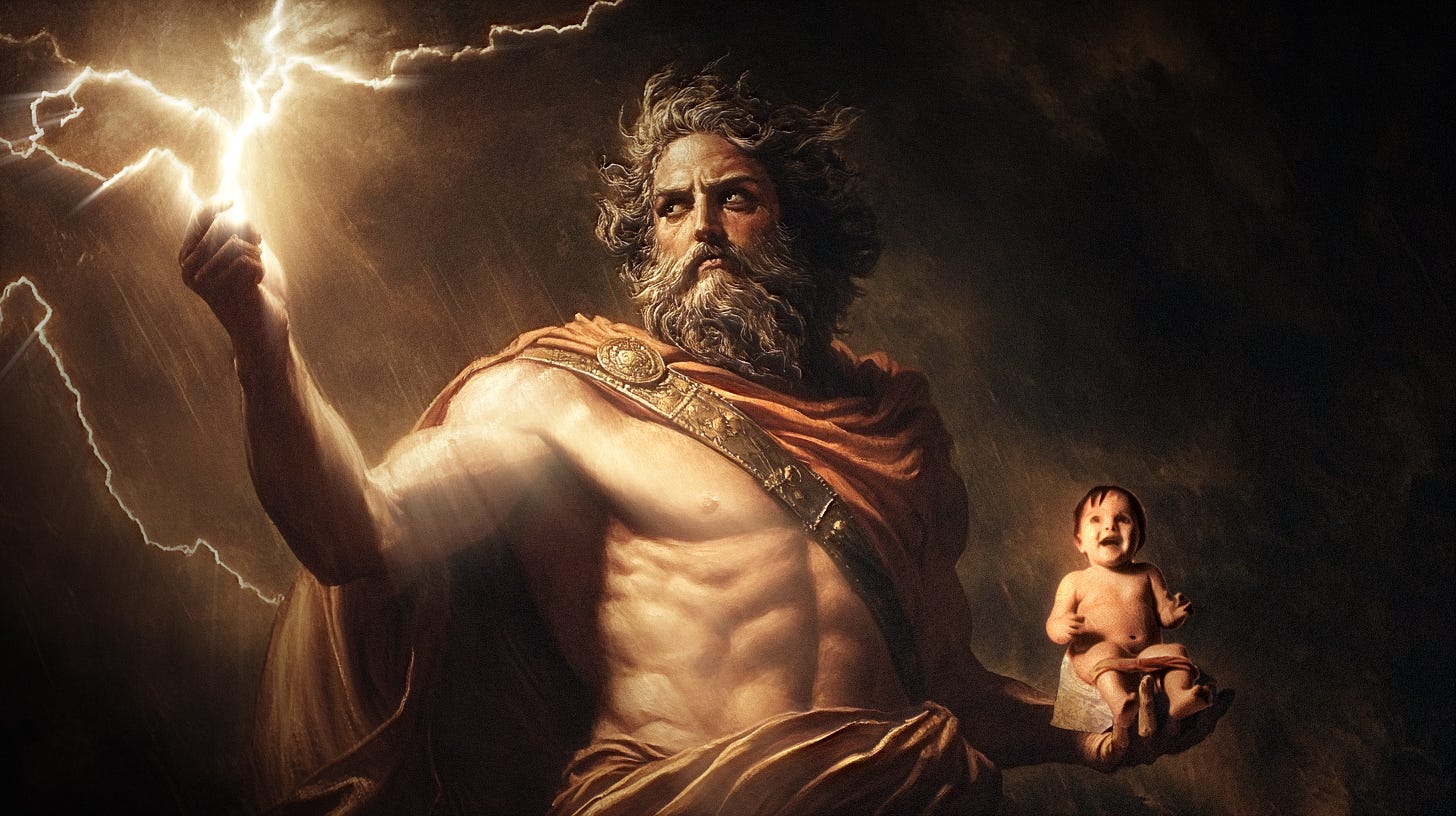My Light Person pal Seth recently sent me an interesting little graph about the nature of American households:

As you can see, households with children are becoming fewer and fewer. This graph tracks with an article in The Atlantic, in which the author discusses how nearly 12% of modern parents regret having children. A Guardian article from 2023 put that number in Germany at 19%. Ouch. American parents regret having children at a rate of 7%. Fourteen percent of Polish parents wish their kids weren’t around, while if you go to England, 8% secretly wish their kids would take a hike.
These articles are interesting, but they leave people like me feeling a deep sense of, well, regret. It’s really hard to read about people who are bummed about birthing humans from their loins, little people who resemble them, and are presented back to them as mystical examples of oneness. Your kids are you, but not exactly. Your parents made you, but somehow you know yourself as utterly self-made. If one really meditates on this, and stays still with the idea long enough, the idea of a human child explodes like a nuclear paradox and the embodiment of the ineffable. This stuff is heavy! To think about a human child surely leads to a discussion of God’s relationship to His creation. We are of Him and yet not Him, right? Heck, even if science is your god, giving birth to the winner of a two-billion-year-old evolutionary race for survival should tamp down the regret factor at least a little. The kid farts a lot sure, but you just gave birth to the tip of the spear! I mean come on Germans, you might be the Supermen of secularity, but can’t you get that regret number into the single digits? How do you say “cradles over cats” in German?
Children are getting sparse. Why is this happening?
First, according to Light People smarties, people seem afraid to risk parental failure. Isabelle Roskam, a clinician and prominent scholar in parental burnout at Belgium’s Université Catholique de Louvain, tells us that “[Modern parents] don’t want to parent because they are not able to be the perfect parent.” Perfectionists are more likely to regret parenting it seems. Another factor the studies seem to identify is something I’ll call a dearth of death options. The studiers all agree that access to abortion is a reason for regretting children. Apparently, higher rates of regret in Poland track with considerably lower access to abortion in Poland. In one study from UC Riverside, “Mothers with a child born as a consequence of abortion denial were more likely to report having difficulty bonding, as well as feeling trapped or resentful.”
Another reason cited by Light People scientists for regretting children is that modern people have no stomach for self-sacrifice. A Psychology Today article quotes a mother: “The loss of selfish things, including time, money, and education really gets to me…” The same article quotes a father who feels anxiety, because fathering “deeply affected my lack of sleep and intimacy.” Then there’s this music-loving father, who says, “I could never regret my son, but I only have a few friends and hearing how much fun they had at a music festival or even just that they were at the bar gets me a little jealous.” Could this Light Person papa have avoided all that jealousy by sacrificing his child way back in utero? I mean, isn’t that what the Mayans were doing up there on those jungle pyramids: You take this kid off my hands and in return send us lots of clear skies and good vibes? And then there’s this very odd New World medical condition called “personality incongruence” which apparently leads to “the natural disdain for progeny.” These afflictions (does that sound right, afflictions?) are cited as reasons for regretting children. One of the afflicted, a woman named Mary, said this: “I just don’t like kids. I am counting down the days until they’re totally independent.”

I mean, okay Mary, join the club. Regretting parenthood from time to time seems kind of normal and obvious, but what isn’t so obvious and normal is the alarming rate of decline in homes with children. For much of Light People history, humans have seemed to push through parental regret in favor of parenting. Today that push is weak and mealy. And it is also demographically lopsided. Notice who has the most childless households: Light People. Children of the Enlightenment have stopped making children. Light People fear Light People babies, and that demands a little more inquiry. To do this, I reached out to our First Things field workers (here’s an explanation of what we do), and asked them if the “unenlightened” cultures they live and work within share the kind of parental regret found in the studies above. Here’s what they told me.
In West Africa, the team reported that the word “choice” plays a huge role when it comes to regret and parenting. For women in West Africa, womanhood is motherhood, and to choose not to have children voluntarily would be tantamount to spending all of your 401k at a dog track. Women have babies. It’s just how it works in West Africa. In fact, the question itself is confusing. Parenting is hard, but not having children would be a sin. But our field workers have noticed that this mentality is changing. Light People in Africa are manufacturing an educational shift in order that mothers may perceive “choice”. We see western NGOs everywhere, most of them publishing houses for neo-colonial equality movements, teaching an enlightened understanding of womanhood and personhood. It seems that the Light People strategy is to offer images of freedom, including freedom from children.
From Guatemala we see a similar story, though with a twist. Our field workers there report that children are never the problem, they are not regretted, but young mothers often talk about how they could have been better mothers if they had waited until they were older. In East Africa, field workers say there’s a tradition where the very last kids in a large family sometimes get a name that represents the feelings of their parents. You can meet kids with names like “Sadness” or “Refuse” or “Lateness”. Again, like in Guatemala, the regret is in the timing, not the children. In Georgia (Republic of) we see again and again that culture rewards mothers for having children. In fact, in 2007, Patriarch Ilia of the Georgian Orthodox Church attempted to boost his nation’s birth rate by promising to be the personal godfather of any third (or more) child in a family. It worked. Georgian women seem to regret kids at lower rates than most European women, ranking number one on the fertility index for all of Europe.
The Old World can tire of children, but they still seem committed to having them.
What explains all of this?
First, there is something to the idea that children in the Old World aren’t meant to be served; they are meant to serve.
In the Old World it is very clear that kids serve their parents. People have kids to serve in the fields. They have kids to take care of them when they grow old. Kids are known to parents as little future nursing home attendants. Old Worlders have kids so they can make them into soldiers who can then claim land. Sons, when they are good sons, upgrade the social status of the parents. Kids allow the family name to persist, especially boy kids. It’s hard for us Light People to hear, but it’s just true: Old World parents often had (and have) kids because they needed them, and not the other way around. And this concept isn’t just kids to parents, you see it in the way younger siblings serve their older siblings too. It’s real: old equals wise, and wisdom must be served.
Old World parents without kids are Old World parents without hope.
But the New World doesn’t understand this kind of thinking. For us, having kids actually impedes our ability to survive and flourish. Having kids decreases a sense of hope in what the future holds. Kids have become evolutionary no-nos these days. I mean, you don’t find parents in modern-day delivery rooms, with little raisin-faced John Boy on mommy’s chest, saying things like, ”Whew, I wasn’t sure how’d we’d survive the next 20 years without this anxiety-inducing creature.”
In the Old World, little John Boy was more like a brand new foot-powered wheat thresher. In the Old World, a birthing day was like a toolkit Christmas for handyman dads. Moms looked at their daughters and thought, “My inflamed dough-kneading forearms already feel better.” Let’s face it, for most of human history, child labor was very, very legal. And in millions of homes across the world this very day, it remains very, very normal.
A second reason why the Old World tends to birth up lots of babies is what I will call, The Sacrifice Quotient. This reason is a bit, shall we say, esoteric. But play along, because I think it is the most forgotten aspect of this kid conversation.
Old World kids were offerings, in more ways than one. The first and most obvious and ugly version of sacrifice was the killing of young ones. A sampling of such offerings includes the Ammonites, living on the east side of the River Jordan circa 1000 BC. Here we find a group of people who offered their kids to the god Moloch. This offering took the form of a bleeding. To death. You can find this in the ancient writings of the Tanakh, the Hebrew bible. The Carthaginians, those Old World folks from Northern Africa, sacrificed kids too. Plato says they used to offer their kids as burnt offerings to their god Cronos. The god of time needed to eat! Turtullian speaks about Phoenicians hanging their kids like “votive offerings on crosses” in order to appease the god El, while the Minoans from the isle of Crete, some 1500 years earlier, held elaborate services where they slaughtered children alongside sheep in order to a secure a rich harvest, and, you guessed it, more children. The Ver Sacrum (“Sacred Spring”) was a custom in which the Sabelli of modern day Italy sacrificed everything born in that chosen spring, whether animal or human. Their god of choice was the sky-dweller Caelus. It seems the death tool of choice for the Ver Sacrum was a big rock thrown again and again. Just about every Old World pre-Columbian culture on this side of the Atlantic got into the child sacrifice game, too. Incan, Mayan and Aztec culture all saw kids substituted for grain and various elixirs in order to amp up the pleasure of the gods and fix those pesky natural disasters. And of course, for you Judeo-Christian types, there is that little story of an old man sent to the top of the mountain to cut his son’s throat. Though Abraham’s little camping trip did not end in an altar nap for Isaac, the idea that it might have was hardly foreign to Abraham’s people. It’s just that Abraham’s God had other ideas.
And that brings us to the second form of sacrifice essential to understanding why Old World people keep having babies, and probably will do so for many years to come.
It seems that children make parents better at being good. Or put another way, it seems that children help parents sacrifice their selves on the altar of godliness. Godliness, it turns out, is important for people who believe in God. Let’s just look at ancient Christianity. Children have always been a way to glorify God. They were given to you as a parent so that you might offer them back, spotless, to God. Yep. God wants your children; the God of the Christians wants your kids for Himself. With the coming of Christ, the narrative in the Middle East moved from appeasement to imitation. The old gods wanted blood so they could claim your allegiance, while the new God wanted your children so that they (and you) could become like God himself. The Christian God offered a divine inheritance, a chance to be like Him. That inheritance came through little deaths. The death found in baptism, the death of the ego, the death of independence, the death of freedom, the death of vanity, and so on. What it no longer included was the death of the innocent. The Christian God despised that sacrifice, so much so that He just did it Himself, once and for all. I’m not saying you have to believe any of this weirdness, I’m just trying to show you how the Old World concept of sacrifice became a new world, and how that new world has been lost to us. It’s been so forgotten that now it seems old.
And odd.
And that’s funny because most of the time we forget how Christianity, if known properly, isn’t really old or new, but rather it rests between and beyond time, beyond the Enlightenment, and yet in it, and after it. And though that idea is probably a future Substack article, I think it applies here because it allows us to learn something important about the nature of children and our modern age. As we see in the Anaphora of the Orthodox Christian liturgy, the time in the liturgy when the Holy Things are consecrated, all children are sacrifices now. In fact, all things are offerings: “Thine own of Thine own we offer unto Thee, on behalf of all and for all.”
Can you see it there in that little line? Do you see the whole thing, the hard part of the equation?
Kids are gifts to you from God, meant to be offered back to your Creator, and offered back as broken and contrite, as humble creatures recognized by the First Giver. And to offer such a gift you have to become such a gift. And you will become such a gift if you first do the offering of having the child. This is a paradox, both very, very Old World and very, very New World. At the core of the Christian equation is God as Alpha and Omega. Nothing exists outside of the Creator, and in that way all things are for Him.
Including your kids. And your ego, and your car. Even your pet! (This substack will be hard for the pet mafia.)
But in the New World, where folks begin equating God and good with self and self-will, this Christian sacrifice idea just seems superfluous. In fact, if you look at how rights work in the New World, you’ll see that they started as “endowed by the Creator” and have ended as “endowed by me”. And that makes sense if the purpose of your birth was to become the person of your choice.
Simply put, when you are your own god, you have all the rights. You are the good. When you are your own god, you have no purpose, in the same way the Christian God has no purpose: He simply is. In a world where you are your own god, you simply are. Sacrifice for such a god seems dumb. I mean, you really think a god wants to become better? And above all, why would such a god have children? Talk about ruining the vibe! No self-respecting modern-day god finds himself eating pizza at a Chuck E. Cheese birthday party. Yuck. What’s next, trying to figure out middle school math with your crying kid on a rainy Thursday night? The life of a real god can’t suffer such indignities. Zuess never changed a diaper, people!
And so goes the line on the graph. Down and downward still until we have zero kids and billions of gods. At that moment, the kid crisis will be over, but be assured a new crisis shall have already begun.







I’d just say that it’s both: your kids are you. Like… there’s no way around it. If you didn’t exist they wouldn’t exist. They carry you within them. That’s not really debatable. How you treat them is a different conversation. Because as you say they are NOT you ALSO. The paradox must be honored. It is both and…
I think.
Abortion is the god to whom babies are sacrificed in our modern era. Mothers offer up their offspring to be rewarded with no burdens or commitments.